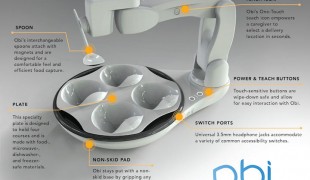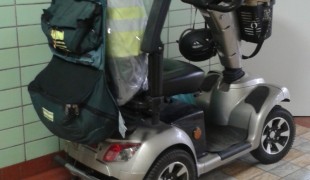- 4472
- 371
- 10
- 13
- 0
- Help Ukraine
About the solution
The MiAssiSt is a DIY, wheelchair-mountable assistive device to support users with reduced upper limb muscle strength in various ADLs such as eating, drinking or using computers. It consists of a passive counterweight and an active add-on. The adjustable counterweight passively compensates for the weight of the lower arm and enables the user to use his own remaining muscle strength as often as possible. If needed, the active add-on provides additional support for lifting heavier objects such as a full glass of water. The add-on is controlled by the index finger of the unsupported arm.
However, to make the MiAssiSt accessible for everyone with similar needs, all the necessary documents to rebuild the MiAssiSt, including user and construction manuals, program codes, CAD models and component lists, are openly available to download here: https://relab.ethz.ch/downloads/open-hardware/MiAssiSt.html
This solution shall not include mention to the use of drugs, chemicals or biologicals (including food); invasive devices; offensive, commercial or inherently dangerous content. This solution was not medically validated. Proceed with caution! If you have any doubts, please consult with a health professional.
-
-
478
-
2
-
6555

Students build device to help aunt who struggles with Parkinson’s disease
(SELF)-CARE: EATING: Eating independently.
(SELF)-CARE: DRINKING: Drinking independently.
Parkinson's Disease
Assistive Daily Life Device (to help ADL)
Gait abnormalities (e.g., walking difficulties, unsteady gait)
Tremors
Difficulty coordinating movements
Muscle weakness
Promoting self-management
Managing Neurological Disorders
Preventing (Vaccination, Protection, Falls, Research/Mapping)
Neurology
Singapore
-
-
-
699
-
0
-
10241

Man creates device to help grandfather feed himself
Grip
(SELF)-CARE: EATING: Eating independently.
Arthritis
Cerebral Palsy
Neuromuscular Disorders
Muscular Dystrophy
Assistive Daily Life Device (to help ADL)
Difficulty walking or moving
Muscle weakness
Muscle cramps or spasms
Difficulty coordinating movements
Stiffness or rigidity (difficulty moving)
Limited range of motion
Muscle pain or stiffness
Reduced grip force (grip)
Loss of muscle coordination
Joint deformity
Joint redness or warmth
Joint pain or swelling
Restoring mobility
Promoting self-management
Managing Neurological Disorders
Medical Genetics
Neurology
Orthopedics
Rheumatology
United States
-
-
-
725
-
0
-
11153

Patient adapts bag for scooters
MOVING IN A WHEELCHAIR: Moving using a wheelchair.
Ehlers-Danlos Syndrome
Intervertebral Disc Disorder
Spinal Cord and Nerve Root Disorders
Assistive Daily Life Device (to help ADL)
Difficulty walking or moving
Muscle weakness
Muscle cramps or spasms
Difficulty coordinating movements
Stiffness or rigidity (difficulty moving)
Limited range of motion
Muscle pain or stiffness
Joint deformity
Joint redness or warmth
Swelling or inflammation
Difficulty bearing weight
Fatigue
Joint pain or swelling
Promoting self-management
Managing Neurological Disorders
Medical Genetics
Neurology
Orthopedics
Belgium
-
 en
en